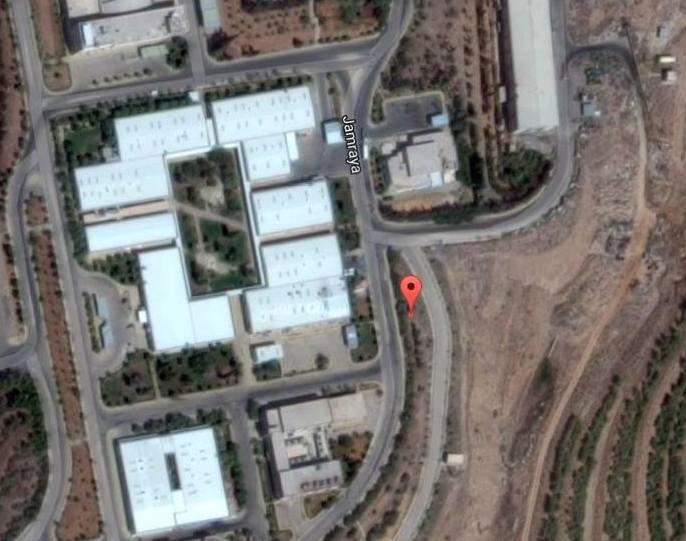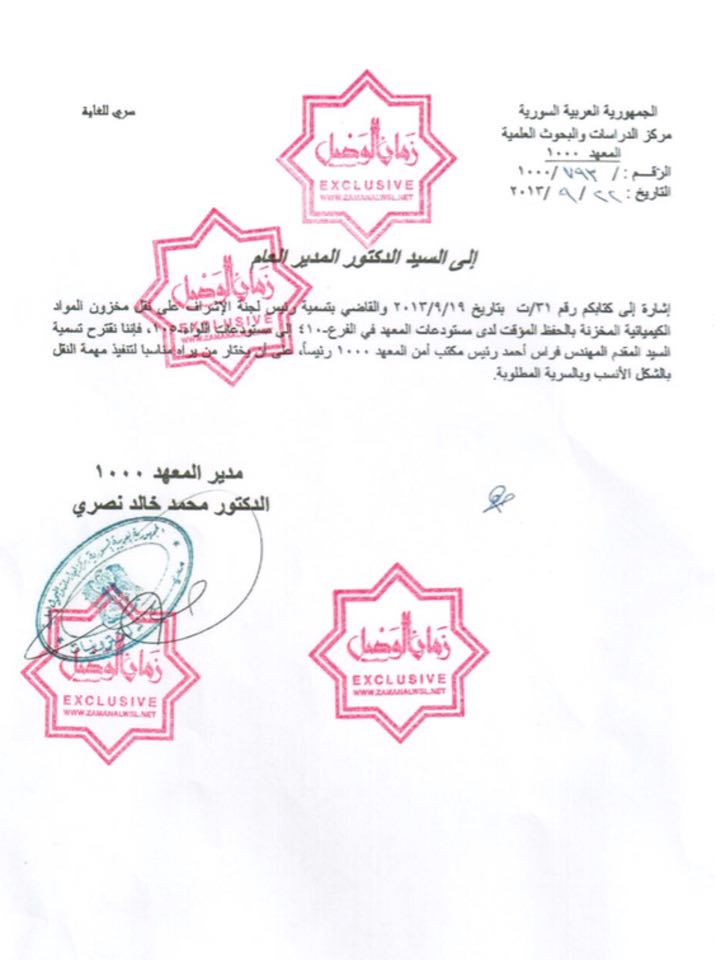(Zaman Al Wasl)- An official document obtained by Zaman al-Wasl reveals that the Syrian regime had transferred most of chemical weapons stockpiles in 2013 to secret depots held by Maher al-Assad, de-facto military commander of Syria after the deadly Sarin gas attack on Eastern Ghouta suburbs.
Moving most of the chemical arsenal from the Institute 1000 in Jamraya to 105th Brigade near the Presidential Palace in Damascus was on September 19, 2013 at the same day the regime handed the UN Organization for the Prohibition of Chemical Weapons (OPCW) a list of chemical sites in the war-torn country, following the Eastern Ghouta Chemical attack on August 21, 2013 when more than 1460 died in the nerve gas attack, two weeks before the arrival of the United Nations inspectors on October 3.
Related:
At the time, the horrific images from the immediate aftermath of the attack drew global outrage.
On Septemebr 27, the Security Council unanimously adoptied resolution 2118 (2013) in a fast-breaking evening meeting, the Council determined that the use of chemical weapons anywhere constituted a threat to international peace and security, and called for the full implementation of the 27 September decision of the OPCW which contains special procedures for the expeditious and verifiable destruction of Syria’s chemical weapons.
Related:
-The Transfer-
The Institute 1000, a research center affiliated to the Branch 410, was founded by the Soviets in 1980s to manufacture chemical weapons in Jamraya village, 2 km (3 miles) to the northwest of the Syrian capital, beyond Mount Qasioun.
The document was issued by the Center for Scientific Studies and Research - Institute 1000 (Institute of Electronics) on 22 September - 2013 5No. 793) signed by the Director of the Institute, Dr. Mohammed Khalid Nasri.
Nasri, according to the document, named Lieutenant Colonel Engineer Firas Ahmed as head of the supervisory committee for the transfer of the stockpiles stored in the warehouses of the Institute to the warehouses of the 105th Brigade of the Republican Guard that led by General Maher Assad, brother of Bashar Assad.
Nasri asked Ahmed who also leads the security in the institute to choose who deems appropriate to carry out the "transport mission in the most appropriate and confidential manner".

The transfer carried out on 19 September 2013 by 50 troops mostly from the Assad stronghold in Latakia came less than a month after the Ghouta Attack.
The selection of troops was based on their sectarian loyalty, and under the supervision of Brigadier Yusuf Ajib, security officer of the Center for Studies and Research.
One of troops who participated in the ‘top-secret mission told Zaman al-Wasl that the process of transferring began on September 24 and continued for a week.

The witness confirmed that the operation began by dividing the elements into five groups, 10 elements per group, after they were transferred from Barzah suburb north of Damascus to Jamraya on 24 September. Then they began on the night of September 25.
The chemical materials were loaded into "Scales" in five refrigerator trucks that were fully filled and then transferred in batches to the 105th Brigade. The items were placed with the "bags" inside the trucks during the transport and unloading process under underground tunnels at the brigade site.
The witness said a parallel operation was underway at the same time to transfer another stockpile from ‘Institute 2000’ in Barzah to the 105th Brigade.
Previous reports published by Zaman al-Wasl reveal how the Assad regime have concealed some of its chemical arsenal and did not hand it over, based on several indications, and that the smuggling operation took place before September 19 of the same year, Prohibition of chemical weapons.
Most of imported materials were hidden, especially which are difficult for the regime to manufacture locally. Some of these materials had been transferred to other warehouses in the coastal region and a Hezbollah-held depot in Qusayr town near the Lebanese border.
Meanwhile, the United States has circulated a draft U.N. Security Council resolution that would extend by two years the mandate of an international inquiry into chemical weapons attacks in Syria, after Russia vetoed an extension last week, Reuters reported.
The U.S. draft says Syria must not develop or produce chemical weapons, and it calls on all parties in Syria to provide full cooperation with the international probe.
The United States has circulated a draft U.N. Security Council resolution that would extend by two years the mandate of an international inquiry into chemical weapons attacks in Syria, after Russia vetoed an extension last week.
The U.S. draft, which was seen by Reuters on Thursday, says Syria must not develop or produce chemical weapons, and it calls on all parties in Syria to provide full cooperation with the international probe.
Syria joined the international Chemical Weapons Convention under a U.S.-Russian deal that followed the deaths of hundreds of civilians in a sarin gas attack in Ghouta on the outskirts of Damascus in August 2013.
It was the deadliest use of chemicals in global warfare since the 1988 Halabja massacre at the end of the Iran-Iraq war, which killed at least 5,000 people in Iraqi Kurdistan.
The Syrian government, which denied its forces were behind the Ghouta attack, also agreed to hand over its declared stockpile of 1,300 tonnes of toxic weaponry and dismantle its chemical weapons program under international supervision.
The United Nations and OPCW have been investigating whether Damascus is adhering to its commitments under the agreement, which averted the threat of U.S.-led military intervention.
The issue of chemical weapons use in Syria has become a deeply political one, and the U.N.-OPCW inquiry’s allegations of chlorine bomb attacks by government forces have split the U.N. Security Council’s veto-wielding members.
The United States, Britain and France have called for sanctions against Syria, while Assad’s ally Russia has said the evidence presented is insufficient to justify such measures.
A Security Council resolution would be required to bring Assad and other senior Syrian officials before the International Criminal Court for any possible war crimes prosecution - something Russia would likely block.
Zaman A Wasl
















Comments About This Article
Please fill the fields below.